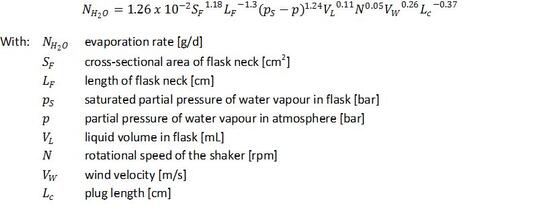Evaporation in shake flasks
Dr Shaker presents the relevant parameters and demonstrates how to calculate the evaporation rate for your experiment [as published by Sumino, J. and Akiyama, S.-I., Ferment. Technol. (1987), Vol. 65 (3), pp 291-294].
Evaporation of culture broth in shake flasks affects fermentation results in two ways: Media concentration rises and evaporation heat is extracted from the liquid.
The evaporation rate is affected not only by the difference in water vapour pressure across the plug, but also by shaking conditions and flask shape.
The larger the water vapour pressure difference between the inside and outside of the flask, the higher the evaporation rate.
The cross section area of the flask neck affects evaporation proportionally, while the length of the flask neck has a reciprocal effect. Given the same cross section area, less water evaporates from a longer neck.
Increasing the rotational speed results in greater water loss, potentially caused by the unequal distribution of water vapour pressure inside and outside the flask.
Increasing the liquid volume increases the evaporation rate and a longer plug allows less water vapour leakage.
Taking all these parameters into consideration, Sumino and Akiyama developed an empirical equation for predicting the evaporation rate in shake flasks:

Knowledge of respective evaporation rates is a prerequisite for successful scale up of experiments, particularly with long-term cultivations.
Further questions regarding your shaken culture?

